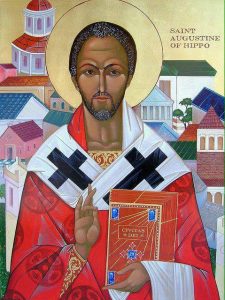 Augustine of Hippo was an early Christian theologian and philosopher whose writings influenced the development of Western Christianity and Western philosophy.
Augustine of Hippo was an early Christian theologian and philosopher whose writings influenced the development of Western Christianity and Western philosophy.
Aurelius Augustinus was born in 354 in Tagaste (modern-day Souk Ahras, Algeria) to a Christian mother and a pagan father, raised in Roman north Africa, educated in Carthage, and employed as a professor of rhetoric in Milan by 383. He followed the Manichaean religion in his student days, and was converted to Christianity by the preaching and example of Ambrose of Milan. He was baptized at Pascha in 387, and returned to north Africa and created a monastic foundation at Tagaste for himself and a group of friends. In 391 he was ordained a priest in Hippo Regius (now Annaba, in Algeria). He became a famous preacher (more than 350 preserved sermons are believed to be authentic), and was noted for combatting the Manichaean heresy.
In 396 he was made coadjutor bishop of Hippo (assistant with the right of succession on the death of the current bishop), and remained as bishop in Hippo until his death in 430. He left his monastery, but continued to lead a monastic life in the episcopal residence. He left a Rule (Regula in Latin) for his monastery that has led him to be designated the “patron saint of Regular Clergy,” that is, parish clergy who live by a monastic rule.
Augustine died on August 28, 430, during the siege of Hippo by the Vandals. He is said to have encouraged its citizens to resist the attacks, primarily on the grounds that the Vandals adhered to heretical Arian Christianity. (NS)